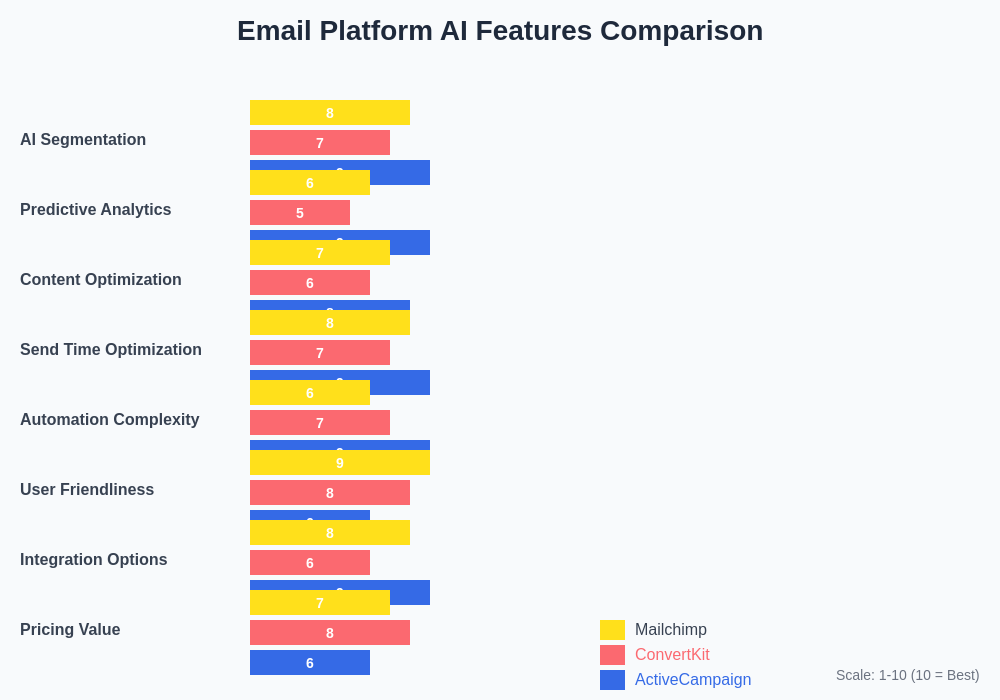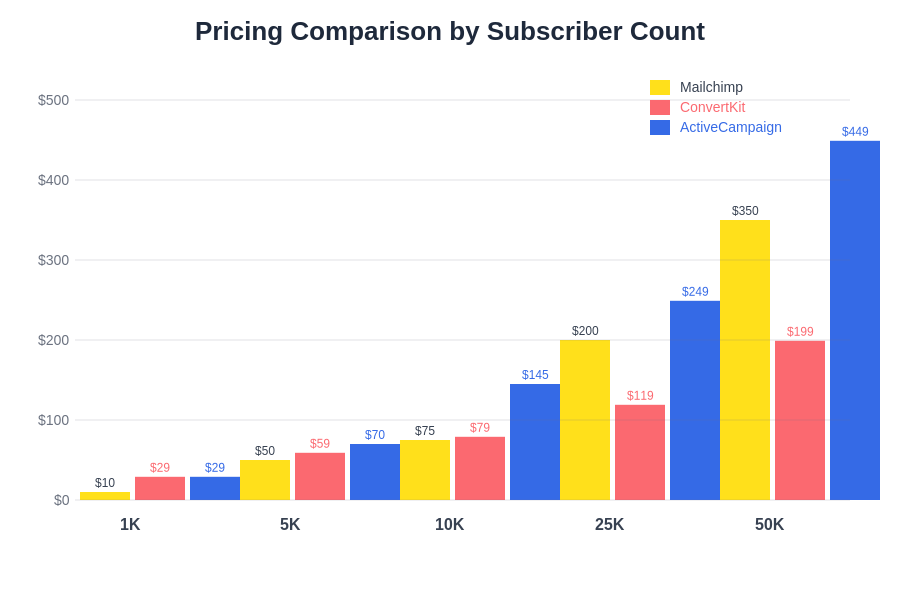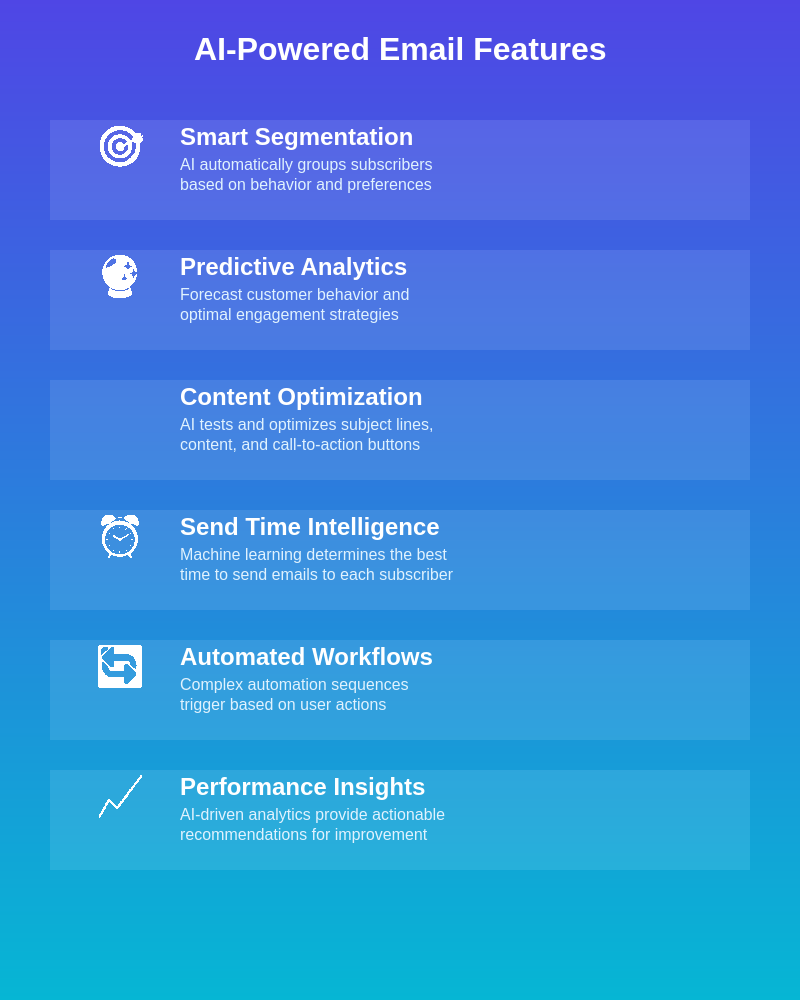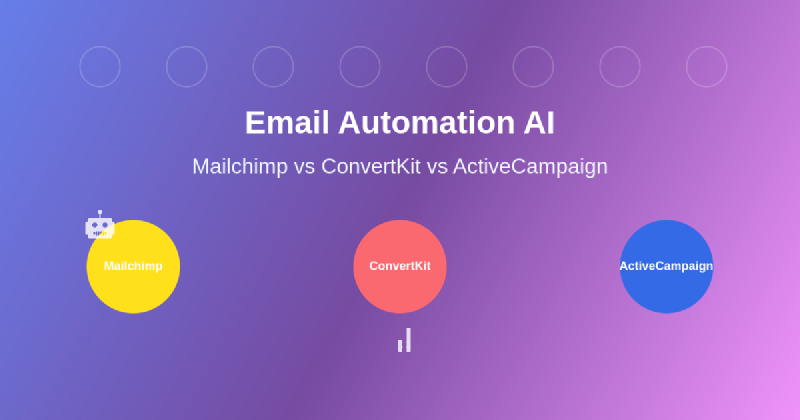The digital marketing landscape has experienced a revolutionary transformation with the integration of artificial intelligence into email automation platforms, fundamentally changing how businesses engage with their audiences and nurture customer relationships. Modern email marketing has evolved far beyond simple newsletter broadcasts to become sophisticated, AI-driven communication ecosystems that deliver personalized experiences at scale, optimize engagement rates, and drive meaningful business outcomes through intelligent automation workflows.
Explore the latest AI marketing trends to discover cutting-edge strategies and technologies that are reshaping how businesses connect with their customers through automated email campaigns and intelligent customer journey optimization. The convergence of artificial intelligence and email marketing has created unprecedented opportunities for businesses to deliver highly targeted, contextually relevant communications that resonate with individual subscribers while maintaining the efficiency and scalability that modern marketing demands.
Among the leading platforms in this AI-powered email automation space, three giants have emerged as industry leaders, each offering unique approaches to artificial intelligence integration, automation sophistication, and user experience optimization. Mailchimp, ConvertKit, and ActiveCampaign represent different philosophies in email marketing automation, from user-friendly simplicity to advanced marketing automation capabilities, providing businesses with diverse options to match their specific needs, technical expertise levels, and growth objectives.
The Evolution of Email Marketing Intelligence
Email marketing has undergone a dramatic transformation from its early days of basic newsletter distribution to today’s sophisticated AI-powered automation systems that can predict customer behavior, optimize send times, and personalize content at an individual level. The integration of machine learning algorithms into email marketing platforms has enabled businesses to move beyond demographic-based segmentation to behavioral prediction, engagement optimization, and dynamic content generation that adapts to each recipient’s preferences and interaction patterns.
Modern email automation platforms leverage artificial intelligence to analyze vast amounts of data points including open rates, click-through patterns, purchase history, website behavior, and engagement timing to create comprehensive customer profiles that inform every aspect of email campaign strategy. This intelligence enables platforms to automatically adjust sending frequency, optimize subject lines, recommend content variations, and predict the optimal timing for individual messages, resulting in significantly improved engagement rates and conversion outcomes compared to traditional email marketing approaches.
The sophistication of contemporary email automation extends beyond simple trigger-based sequences to encompass predictive analytics, sentiment analysis, and real-time personalization that creates truly individualized communication experiences for each subscriber. These advanced capabilities have democratized access to enterprise-level marketing intelligence, allowing businesses of all sizes to implement sophisticated automation strategies that were previously available only to large corporations with substantial marketing technology budgets and dedicated data science teams.
Mailchimp: Democratizing AI-Powered Email Marketing
Mailchimp has established itself as the quintessential entry point for businesses venturing into AI-enhanced email marketing, combining user-friendly design principles with increasingly sophisticated artificial intelligence capabilities that make advanced automation accessible to users regardless of their technical expertise. The platform’s approach to AI integration focuses on simplifying complex marketing concepts while providing powerful automation tools that can grow with businesses as their marketing needs evolve and become more sophisticated.
The platform’s AI-powered features include intelligent segmentation algorithms that automatically categorize subscribers based on behavior patterns, engagement levels, and predicted interests, eliminating the need for manual list management while ensuring that each campaign reaches the most relevant audience segments. Mailchimp’s machine learning systems continuously analyze campaign performance data to provide actionable insights and recommendations for improving subject lines, send times, and content strategies, making it easier for marketers to optimize their campaigns without requiring deep expertise in data analysis or marketing automation principles.
Enhance your marketing automation with advanced AI tools like Claude to complement your email marketing efforts with intelligent content creation, campaign analysis, and strategic planning capabilities that can elevate your marketing results. Mailchimp’s integration capabilities allow businesses to connect their email marketing efforts with broader AI-powered marketing ecosystems, creating comprehensive customer engagement strategies that span multiple touchpoints and communication channels.
One of Mailchimp’s most significant AI innovations lies in its predictive analytics capabilities, which analyze historical data to forecast customer lifetime value, predict optimal send times for individual subscribers, and identify subscribers who are most likely to engage with specific types of content. These predictive insights enable marketers to make data-driven decisions about campaign timing, content selection, and resource allocation, maximizing the return on investment for email marketing efforts while minimizing the risk of subscriber fatigue or list degradation.
The platform’s content optimization features utilize natural language processing and machine learning algorithms to analyze the performance of different messaging approaches, automatically testing variations in tone, length, and structure to identify the most effective communication styles for different audience segments. This continuous optimization process ensures that email campaigns become more effective over time, learning from each interaction to refine future communications and improve overall campaign performance across all subscriber segments.
ConvertKit: Creator-Focused AI Automation
ConvertKit has carved out a distinctive position in the email automation landscape by focusing specifically on the needs of creators, influencers, and content-driven businesses, integrating artificial intelligence capabilities that align with the unique requirements of audience building, content monetization, and community engagement. The platform’s AI features are designed to support the creator economy’s emphasis on authentic relationship building while providing the automation sophistication necessary to scale personal brands and content businesses effectively.
The platform’s intelligent tagging and segmentation systems automatically categorize subscribers based on their interests, engagement patterns, and interaction history with specific content types, enabling creators to deliver highly targeted communications that reflect individual subscriber preferences and engagement behaviors. This granular segmentation capability allows creators to maintain the personal connection that defines successful creator-audience relationships while scaling their communication efforts to reach thousands or even millions of subscribers without losing the authenticity that drives creator success.
ConvertKit’s AI-powered automation sequences go beyond traditional email marketing to encompass comprehensive customer journey orchestration that guides subscribers through complex sales funnels, educational sequences, and community engagement pathways. The platform’s machine learning algorithms analyze subscriber behavior across multiple touchpoints to optimize the timing, frequency, and content of automated sequences, ensuring that each subscriber receives communications at the optimal moments for engagement and conversion.
The platform’s content performance analytics utilize artificial intelligence to identify the most engaging topics, formats, and messaging approaches for different audience segments, providing creators with data-driven insights that inform not only their email marketing strategies but also their broader content creation efforts. This integration between email performance and content strategy helps creators align their communication efforts with their audience’s evolving interests and preferences, maintaining high engagement rates while building sustainable, long-term audience relationships.
ConvertKit’s AI features extend to revenue optimization, with intelligent systems that analyze purchase patterns, subscription behaviors, and engagement metrics to identify the most effective strategies for product launches, course sales, and membership site promotions. These insights enable creators to time their promotional activities optimally, segment their audiences for maximum conversion potential, and develop pricing strategies that reflect their audience’s purchasing behaviors and preferences.
ActiveCampaign: Enterprise-Grade AI Marketing Automation
ActiveCampaign represents the pinnacle of AI-powered email marketing automation, offering enterprise-level sophistication and intelligence that rivals dedicated customer relationship management platforms while maintaining focus on email marketing excellence. The platform’s approach to artificial intelligence integration encompasses every aspect of the customer lifecycle, from initial awareness and acquisition through retention and advocacy, creating comprehensive marketing automation ecosystems that drive business growth and customer satisfaction.
The platform’s predictive analytics capabilities utilize machine learning algorithms to analyze customer behavior patterns, purchase history, and engagement data to forecast future actions, identify high-value prospects, and predict customer lifetime value with remarkable accuracy. These predictive insights enable businesses to allocate marketing resources more effectively, prioritize leads based on conversion probability, and develop retention strategies that focus on customers with the highest long-term value potential.
Leverage comprehensive AI research tools like Perplexity to enhance your email marketing strategy development with in-depth market analysis, competitor research, and industry trend identification that can inform your ActiveCampaign automation strategies. The platform’s integration capabilities allow businesses to connect their email marketing automation with broader business intelligence systems, creating holistic customer engagement strategies that leverage data from multiple sources and touchpoints.
ActiveCampaign’s AI-powered personalization engine goes far beyond simple name insertion to deliver dynamic content that adapts in real-time based on individual subscriber preferences, behavior patterns, and contextual factors such as location, device type, and time of engagement. This sophisticated personalization capability enables businesses to create email experiences that feel individually crafted while maintaining the efficiency and scalability required for large-scale marketing operations.
The platform’s intelligent automation builder utilizes artificial intelligence to suggest optimal workflow configurations, identify potential bottlenecks in customer journey mapping, and recommend improvements to existing automation sequences based on performance data and industry best practices. This AI-assisted workflow optimization ensures that businesses can implement sophisticated marketing automation strategies without requiring extensive expertise in automation design or customer journey orchestration.
ActiveCampaign’s lead scoring and customer segmentation algorithms continuously analyze subscriber behavior to assign dynamic scores that reflect engagement levels, purchase propensity, and overall value to the business. These intelligent scoring systems enable sales and marketing teams to prioritize their efforts on the highest-value prospects while ensuring that nurturing campaigns are tailored to each segment’s specific needs and characteristics.
Comparative Analysis: Features and Capabilities
The fundamental differences between Mailchimp, ConvertKit, and ActiveCampaign become apparent when examining their respective approaches to AI integration, automation sophistication, and target market focus. Each platform has developed distinct strengths that cater to different business needs, technical requirements, and marketing objectives, making the selection process dependent on factors beyond simple feature comparison.

This comprehensive analysis reveals how each platform excels in different areas of email marketing automation, with Mailchimp leading in user-friendliness, ConvertKit offering balanced creator-focused features, and ActiveCampaign dominating in advanced automation and predictive analytics capabilities.
Mailchimp’s strength lies in its accessibility and ease of use, making AI-powered email marketing available to businesses without dedicated marketing teams or extensive technical expertise. The platform’s AI features are designed to work automatically in the background, providing intelligent optimization without requiring users to understand the underlying algorithms or data science principles. This approach makes Mailchimp ideal for small businesses, e-commerce stores, and organizations that need effective email marketing automation without the complexity associated with more advanced platforms.
ConvertKit occupies a unique middle ground, offering more sophisticated automation capabilities than Mailchimp while maintaining a focus on creator-specific needs and use cases. The platform’s AI features are specifically designed to support content creators, course developers, and personal brand builders who need to balance automation efficiency with authentic audience relationships. ConvertKit’s strength lies in its ability to scale personal communication strategies without losing the individual touch that defines successful creator-audience relationships.
ActiveCampaign represents the most sophisticated option, offering enterprise-level AI capabilities that rival dedicated marketing automation platforms and customer relationship management systems. The platform’s comprehensive feature set includes advanced predictive analytics, complex workflow automation, and deep integration capabilities that make it suitable for businesses with complex sales processes, multiple customer segments, and sophisticated marketing requirements.
Integration Ecosystems and Platform Connectivity
The modern email marketing landscape requires seamless integration with broader marketing technology stacks, and each platform approaches ecosystem connectivity differently based on their target markets and strategic objectives. Understanding these integration philosophies is crucial for businesses that need their email marketing automation to work harmoniously with existing systems and future technology additions.
Mailchimp has developed an extensive integration ecosystem that emphasizes simplicity and breadth, offering connections to hundreds of popular business applications including e-commerce platforms, social media tools, customer service systems, and analytics platforms. The platform’s API and integration approach prioritize ease of implementation and maintenance, making it straightforward for businesses to connect their email marketing efforts with existing operational systems without requiring extensive technical expertise or development resources.
ConvertKit’s integration strategy focuses on creator economy tools and platforms, offering deep connections to course platforms, membership sites, payment processors, and content management systems that creators commonly use to build and monetize their audiences. The platform’s integration philosophy emphasizes maintaining data consistency across the creator’s entire business ecosystem while providing the flexibility to adapt to the rapidly evolving creator economy technology landscape.
ActiveCampaign offers the most comprehensive integration capabilities, with enterprise-level API access, webhook support, and deep data synchronization options that enable complex, bidirectional data flows between email marketing automation and other business systems. The platform’s integration approach is designed to support sophisticated business requirements including custom CRM implementations, enterprise resource planning systems, and complex sales and marketing technology stacks.
Pricing Models and Value Optimization
Understanding the pricing structures and value propositions of each platform requires careful consideration of not only the direct costs but also the potential return on investment, scalability implications, and total cost of ownership as businesses grow and their email marketing needs become more sophisticated.

The pricing landscape across these three platforms reveals distinct strategies, with Mailchimp offering the most accessible entry point for small businesses, ConvertKit maintaining consistent value for creators at scale, and ActiveCampaign commanding premium pricing that reflects its enterprise-level feature sophistication.
Mailchimp operates on a freemium model that allows businesses to start with basic email marketing capabilities at no cost, gradually scaling pricing based on subscriber count and feature requirements. This approach makes the platform particularly attractive for new businesses and startups that need to minimize initial costs while building their subscriber base and email marketing expertise. The platform’s pricing transparency and predictable scaling make it easy for businesses to forecast their email marketing expenses as they grow.
ConvertKit uses a subscriber-based pricing model that reflects its focus on creator businesses, with pricing tiers designed to accommodate the rapid audience growth that successful creators often experience. The platform’s pricing structure includes all core features at every tier, differentiating based on subscriber limits and advanced features rather than restricting basic automation capabilities. This approach aligns with creator business models where audience size directly correlates with revenue potential.
ActiveCampaign implements a more complex pricing structure that reflects its comprehensive feature set and enterprise-level capabilities, with multiple pricing tiers that unlock increasingly sophisticated automation, analytics, and integration features. The platform’s pricing model is designed to scale with business sophistication rather than just subscriber count, recognizing that enterprise clients derive value from advanced features regardless of their audience size.
Performance Analytics and Optimization Intelligence
The ability to measure, analyze, and optimize email marketing performance represents a critical differentiator between platforms, with each offering distinct approaches to analytics, reporting, and performance optimization that reflect their target markets and strategic focuses.
Mailchimp’s analytics approach emphasizes accessibility and actionable insights, presenting performance data in intuitive formats that make it easy for non-technical users to understand campaign effectiveness and identify improvement opportunities. The platform’s AI-powered insights automatically identify trends, anomalies, and optimization opportunities, providing recommendations in plain language that enable users to improve their campaigns without requiring expertise in data analysis or statistical interpretation.
ConvertKit’s analytics focus on creator-specific metrics that reflect the unique success factors of creator businesses, including subscriber growth rates, engagement quality, and revenue attribution from email campaigns. The platform’s reporting capabilities emphasize the connection between email marketing performance and broader creator business objectives, helping users understand how their email strategies contribute to audience building, content engagement, and revenue generation.
ActiveCampaign provides enterprise-level analytics capabilities including advanced segmentation analysis, cohort tracking, customer journey mapping, and revenue attribution modeling that enable sophisticated businesses to understand the complete impact of their email marketing automation efforts. The platform’s analytics suite includes predictive modeling capabilities that forecast future performance based on current trends and historical patterns, enabling proactive optimization and strategic planning.
Security, Compliance, and Data Protection
In an era of increasing privacy regulations and data protection requirements, each platform’s approach to security, compliance, and data handling represents a crucial consideration for businesses operating in regulated industries or serving global audiences with varying privacy expectations.
All three platforms maintain robust security infrastructure including encryption, secure data transmission, and regular security audits that meet industry standards for protecting customer data and ensuring system reliability. However, their approaches to compliance and data protection reflect their different target markets and operational philosophies.
Mailchimp offers comprehensive compliance tools designed to help businesses navigate regulations such as GDPR, CAN-SPAM, and other regional privacy laws without requiring extensive legal expertise. The platform’s compliance features are integrated throughout the user experience, making it difficult for users to inadvertently violate regulations while providing clear guidance on best practices for data collection, storage, and usage.
ConvertKit’s compliance approach focuses on creator-specific scenarios and requirements, providing tools and guidance that address the unique challenges creators face when building and managing subscriber lists across multiple platforms and jurisdictions. The platform emphasizes transparency and subscriber consent management, reflecting the creator economy’s emphasis on authentic relationships and ethical audience building practices.
ActiveCampaign provides enterprise-level compliance and security features including advanced data governance tools, audit trails, and customizable privacy controls that enable large organizations to implement email marketing automation while meeting their specific regulatory and security requirements. The platform’s enterprise focus extends to offering dedicated support for compliance implementation and ongoing regulatory adherence.
Future Trends and Platform Evolution
The email marketing automation landscape continues evolving rapidly as artificial intelligence capabilities advance, privacy regulations become more complex, and customer expectations for personalized experiences increase. Understanding how each platform is positioning itself for future developments provides insight into their long-term viability and strategic alignment with emerging market trends.
Machine learning and AI capabilities across all platforms are becoming more sophisticated, with improvements in predictive analytics, content optimization, and behavioral analysis that promise to deliver increasingly personalized and effective email experiences. The integration of natural language processing and generation capabilities is enabling more sophisticated content creation and optimization, while advanced analytics are providing deeper insights into customer behavior and preferences.

The evolution of AI-powered email marketing features continues to accelerate, with each platform developing increasingly sophisticated capabilities that automate complex marketing tasks while maintaining the personal touch that drives successful customer relationships.
Privacy-focused features and consent management are becoming increasingly important as regulations like GDPR and CCPA establish new standards for data protection and customer privacy rights. Platforms are investing heavily in tools and features that help businesses maintain compliance while still delivering effective marketing automation, balancing personalization capabilities with privacy protection requirements.
Cross-channel integration and omnichannel marketing capabilities represent another significant trend, with email marketing platforms expanding their scope to encompass social media marketing, SMS marketing, and other communication channels. This expansion creates opportunities for more comprehensive customer engagement strategies while requiring businesses to consider how their email marketing platform choice will impact their broader marketing technology stack.
The continued democratization of artificial intelligence is making advanced marketing automation capabilities available to smaller businesses and individual creators, while enterprise platforms are focusing on increasingly sophisticated features that support complex business requirements and advanced use cases. This bifurcation of the market suggests that platform selection will become increasingly important as businesses must choose between broad accessibility and specialized sophistication.
Implementation Strategies and Best Practices
Successfully implementing AI-powered email marketing automation requires careful planning, strategic thinking, and ongoing optimization that goes beyond simple platform selection to encompass comprehensive marketing strategy development and execution excellence.
Beginning with clear objectives and success metrics ensures that email marketing automation efforts align with broader business goals and provide measurable value to the organization. Whether focusing on lead generation, customer retention, revenue growth, or audience engagement, establishing specific, measurable goals enables more effective platform utilization and performance optimization over time.
Segmentation strategy development represents a critical success factor regardless of platform choice, as even the most sophisticated AI capabilities require thoughtful audience organization and targeting to deliver optimal results. Effective segmentation combines demographic, behavioral, and psychographic factors to create meaningful audience groups that enable personalized communication strategies and targeted automation workflows.
Content strategy and creative development must align with automation capabilities and audience preferences to maximize engagement and conversion outcomes. This includes developing content templates, establishing brand voice guidelines, and creating systematic approaches to content creation that can scale effectively while maintaining quality and relevance across different audience segments and automation sequences.
Testing and optimization processes should be integrated into email marketing automation from the beginning, with systematic approaches to A/B testing, performance analysis, and continuous improvement that enable ongoing refinement of strategies, messaging, and automation workflows. The most successful email marketing automation implementations treat optimization as an ongoing process rather than a one-time setup activity.
Strategic Platform Selection Guidelines
Choosing between Mailchimp, ConvertKit, and ActiveCampaign requires careful evaluation of current needs, future growth plans, technical capabilities, and strategic objectives that go beyond simple feature comparison to encompass comprehensive business alignment and long-term value optimization.
Small businesses and startups with limited marketing experience and budget constraints will likely find Mailchimp’s combination of accessibility, comprehensive features, and scalable pricing most aligned with their immediate needs and growth trajectories. The platform’s emphasis on ease of use and automatic optimization makes it ideal for businesses that need effective email marketing without requiring extensive marketing expertise or dedicated resources.
Creators, influencers, and content-driven businesses should carefully consider ConvertKit’s specialized features and creator-focused optimization, particularly if their business models depend heavily on audience relationships, content monetization, and community engagement. The platform’s balance between automation sophistication and personal touch makes it particularly suitable for businesses where authentic audience relationships drive success.
Large businesses, complex organizations, and companies with sophisticated marketing requirements will benefit most from ActiveCampaign’s comprehensive feature set, advanced integration capabilities, and enterprise-level analytics and automation features. The platform’s higher complexity and cost are justified for businesses that can leverage its advanced capabilities to drive significant revenue and efficiency improvements.
The decision ultimately depends on balancing immediate needs with future growth plans, technical capabilities with ease of use requirements, and feature sophistication with budget constraints to identify the platform that provides the best long-term value and strategic alignment for specific business objectives and operational characteristics.
Disclaimer
This article is for informational purposes only and does not constitute professional advice. The features, pricing, and capabilities of email marketing platforms may change frequently, and readers should conduct their own research and evaluation based on their specific requirements. The effectiveness of email marketing automation varies depending on implementation quality, audience characteristics, and business context. Always ensure compliance with applicable privacy regulations and email marketing laws in your jurisdiction.
